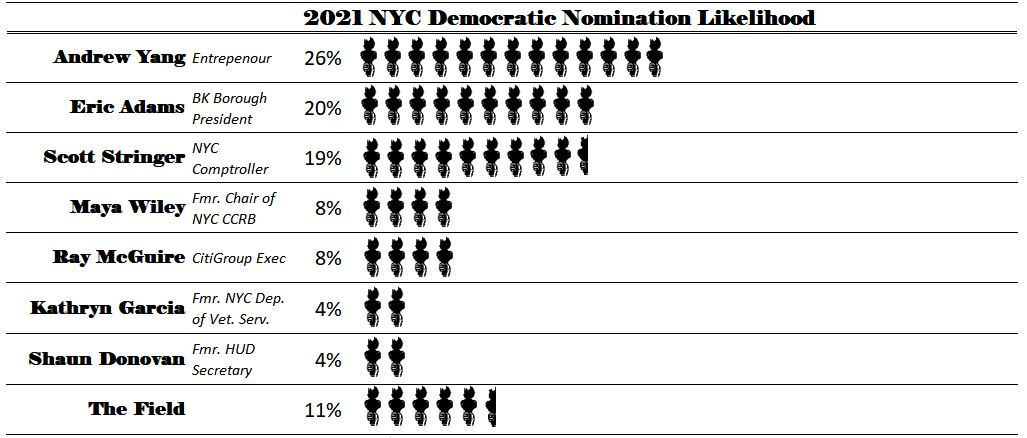Happy new year! We made it to 2021!
We all have a know-it-all friend who keeps saying, “it is not like things are going to change as soon as the year turns.” I give you full permission to roll your eyes. Vaccines are (slowly) being distributed, we will have a new mayor elected, and we have a new Met’s owner. Hope has arrived.
Another major change: a new federal government. New York City we will have three new congresspersons, with Nicole Malliotakis (R), Ritchie Torres (D), and Jamaal Bowman (D) replacing Max Rose (D), Jose Serrano (D), and Elliot Engel (D). In this week’s 2xParked we will look back at the recently concluded 116th congress.
House of Representatives
@2xParked follows on Twitter nearly all of the legislators who represent NYC, from the City Council to the Senate. Besides proving to be extremely poor data analysts, what has alarmed me most about these legislators is the common expression “we need to do…”. Not only is this phrase usually associated with finger pointing, but it highlights a lack of accountability.
“We” the voters have already exercised our greatest source of power, electing you into office to represent us in the legislative process. “You” need to figure out how to do your job. In the House of Representatives, this means representing constituents in the legislation of federal laws.
What does it mean to “represent”? Different voters have different interpretations. I will show some data from the 115th & 116th congresses (2016-2019) so you can come up with your own opinions of who is doing their job well.
What the People Want
From this perspective of democracy, the expectation of the representative is to vote based on how their constituents would vote if they were in Washington.
On the X-Axis, we simply have the 2019 attendance (GovTrack), which is our minimum expectation of our representatives. We would expect that number to be as close to 100% as possible, which for the most part it is for NYC. (There were quite a few representatives who made less than 90% of the vote, mostly due to travel or illness).
On the Y-Axis, it is a bit more interesting. This is a measure created by Nate Silver at 538. This number represents how the congressperson has voted on bills compared to what you might expect given the margin of victory of the presidential candidate in that district. We expect this number to be around 0. In an area that voted heavily towards Trump, you would expect the candidate to vote mostly along the lines of Trump. In an area that voted heavily against Trump, you would expect the candidate to vote against what Trump supports. In a 50-50 district, you would expect the candidate to vote 50-50.
For the most part, NYC congress has voted in line with how their constituents might have. The one exception is Max Rose. Rose, a moderate democrat, represented a district which heavily supported Trump. Voting mostly in line with Democrat policies might help explain why he was not re-elected.
What the People Need
There is a distinction between what people want and need. Many believe our elected officials have a duty to do what is best for their constituents, and not what their constituents think is best. This requires faith of the people and integrity/courage of the legislator.
I know this is an academic perspective. With accountability to the voters and party every two years, along with the prisoner's dilemma which other members enjoy playing, the best we can hope for is an occasional stand for principle regardless of stakeholder disappointment. In statistics, we refer to this concept as independence.
I decided to look at how our congress supports policies based purely on the party or opposite party’s view. Since the 116th congress only featured NYC Dems, I modeled how Dems voted in line when Trump supported a bill vs when Trump did not (which was a proxy for Dem support) using data collected by 538.
It comes to no surprise that Ocasio-Cortez is the least likely NYC congressperson to vote on the party-line. You have to remember that AOC has only been around for the 116th congress, which had a very strong Democratic majority. Her “nay” votes mostly had very little impact besides being symbolic for marketing future political ambitions. It will be much more interesting when the 117th congress commences. With a much smaller Dem majority, will she continue to take these stands? If she plays her cards right, she will have the opportunity to push more progressive language in the bills. If she plays her cards wrong, she will be the roadblock for progress.
Additionally, Max Rose is modeled as being the second most likely to support Republican policy. Coming from a swing district, Rose does not have the same comfort that the other NYC congresspersons have of safely being in line with all Dem policies and no GOP policies. Newly elected swing district officials have to closely examine which policies on both sides are best for their constituents, or they risk being forced out in two years.
Walk-the-Walk vs. Talk-the-Talk
It is not just about what you support but what you create. We hear on the generic campaign trail how all of our legislators claim to be leaders, and this is the true test. Creating a bill requires more than pointing fingers. It requires translating your vision into words and gaining support. The House represents little sectors of people with varying beliefs, so translating your bill into a win for others is a tough game. The more radical the view, the tougher it is to get passed, but a good politician will know where to make compromises and deals to get it passed. As we have seen, nothing is truly impossible when to comes to government.
I decided to map the number of bills introduced in 2019 vs the number of Twitter Followers by representative. This is a representation of who has the voice to make change verse who is actually passing the bills. It especially highlights those who may not have loud voices to correspond with loud victories, such as Meng, Espaillat and Velazquez.
My Observations
I am not here to make political statements or conclusions. Rather, as a voter, I rarely have looked at the whole data of my legislator. Occasionally I have seen a snippet in the news or something on Twitter, but I honestly could only tell you a small percent of what my legislator had done prior to this exercise. I imagine many of you are in a similar boat. Here are some of my observations from this data exploration:
“Old'' Guard Still Leading: Maloney, Nadler, Velazquez and the other veteran NYC members of the House have proven to be leaders with all their experience. Leadership among a house filled with leaders is not always easy to quantify. It will be interesting to see how Bowman adjusts as he fills the seat he won over Engel, who was among the best at crossing the aisle. It will take years for Bowman to gain the House power that Engel had acquired, so he deserves time, but who will fill Engel’s void?
Make or Break Years for AOC: As I alluded to earlier, this is a big term for Ocasio-Cortez. She did not pass much legislation as a freshman, but with one of the strongest followings, there is opportunity in the next two years to become a leader with bills to her name which implement her proposed policies. As the liberal seat in the house, if she is able to implement, she could propel her name to the next level. If she is unable to do so, she might have to wait before getting the national recognition of accomplishment she might desire.
What is Next for Max Rose: Rose was voted in and out by the only borough which supported Donald Trump. The reason for his booting may have been that his views were not conservative enough for his constituents, or it might have been the overall Democratic branding in a GOP area (as many news outlets suggest). Regardless, he entered and left the mayor race with one of the strongest moderate records (and one of the only candidates with a public record period).
MayorModel
The first domino fell Sunday, as Max Rose has dropped out of the race. This coincidence made for perfect timing with the release of the House Edition of 2xParked (and it was really a coincidence).
With Rose’s departure, it leaves a bit of a void among mayoral candidates. He was among the top polling candidates and most recognizable names. From an ideological perspective, this is a time for Donovan, Iscol, or Sutton to win over his supporters, which would be a big leap for them. From a ranked-choice perspective, Stringer, Yang, Adams and Wiley will benefit from having less competition as brands vying for 2nd or 3rd ranked choices. As we know though, policy and ideology are nice, but inevitably, Rose’s relatability was what resonated with voters. We will have to wait to see if any of the candidates can fill that role on the ballot.
"House Cat" was drawn by Ink&thyme, drawing life's unforgettable moments. For unique art drawn just for you, check them out on Facebook and on Instagram.
To subscribe to future newsletters, click here.
For more content, follow 2xParked on Twitter @2xParked.
Comments? Suggestions? Questions? Email me at 2xParked@gmail.com.







